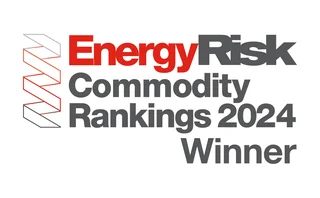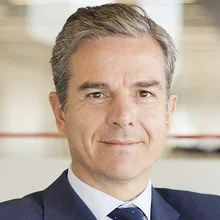
Axpo recognised for bringing competitive pricing and liquidity to gas and power markets


Energy market participants give recognition to the Swiss utility as it brings competitive pricing and liquidity to embattled gas and power markets
Last year some normality returned to European energy markets after the extremes of 2022. But, with bursts of volatility and insufficient liquidity, they remained challenging for suppliers and consumers alike.
With some gas and power suppliers unwilling to renew or extend contracts on the same terms, it became harder for consumers to find competitive prices. Larger energy firms that were able to offer preferable prices had to take on and manage more risk, especially credit risk.
The Energy Risk Commodity Rankings 2024 shed light on which firms are considered by market participants to have negotiated these challenges most successfully to provide the best services to their clients. Survey respondents voted for their preferred trading counterparties in a variety of categories spanning the commodities complex.
Axpo gained numerous first and second places in the gas and power categories in this year’s rankings, including number one positions for power in the UK, Netherlands, Spain and Portugal, and Central and Eastern Europe, and second place in power and gas in Italy. It was also voted top for pricing, reliability, flexibility, speed of execution, integrity and market knowledge, indicating that market participants feel Axpo understands its clients’ needs and is able to offer vital services under challenging conditions.

“Last year was a difficult one for our clients given the volatility in the markets,” says Ignacio Soneira Garcia, managing director for Axpo Iberia. While these conditions made hedging harder, they also made it more important, he notes. “Consumers and producers are aware of how important it is to hedge some of their needs to avoid a big swing in their results.”
Underlying Axpo’s ability to execute hedging programmes for its clients, even in thin markets, is its wide market reach and diverse client base, says Michiel Rutgers, managing director for Axpo Netherlands. “The type of clients we service has become a lot more diverse. We now service not just the traditional industry, but we’ve branched into the corporate and public sectors. We have a much more complex portfolio now with many more delivery points.”
Throughout last year, Axpo also played a lead role in introducing long-term liquidity to the power markets through power purchase agreements (PPAs). In 2023, the firm signed the first wind power PPA in Croatia and the first corporate PPA in Slovenia.

“These PPAs allow plants to be developed in countries where the markets are not yet very mature and provide the opportunity for companies across Europe to buy green power, some for the first time,” says Domenico Franceschino, head of origination West and East Europe and member of the management board at Axpo Solutions.
Energy Risk spoke with Axpo executives from across Europe to discuss recent challenges in different regions.
What were the main challenges facing your clients in the natural gas markets last year?

Simone Rodolfi, Axpo Italia: Market volatility and uncertainty were the main issues for clients in the Italy region last year. Although winter was warm and industrial consumption lower than expected, there was a risk premium priced into the forward curve that reflected the uncertainty of the international situation.
Michiel Rutgers, Axpo Netherlands: In the Netherlands in recent years, we’ve seen a definite decrease in the number of natural gas suppliers. Also, many consumers were actively exploring ways to reduce their scope 1 emissions, making their natural gas offtake more uncertain. As a result, many large consumers found it difficult to find natural gas supply at competitive prices. Axpo was one of very few firms able to manage this uncertainty and offer well-priced natural gas supply, including fixed-price contracts, and that helped grow our gas portfolio.
Steve McCarthy, Axpo Group: Similarly, in the UK, we experienced quite a few new consumers coming to market, either reassessing their incumbent energy supplier or in a more distressed state where their incumbent provider wasn’t able or willing to continue the current arrangement. We worked very hard to ensure continuity for our clients, while also taking on a raft of new ones.
How were you able to help clients that had lost their suppliers?

Steve McCarthy: In the UK, it was a case of taking a pragmatic approach to the credit side of things. The credit market dried up considerably in terms of insurance or credit appetite from other participants. That’s an area we worked very hard on – to maintain our credit appetite but also to come up with innovative solutions for clients to ensure we could supply them when others couldn’t. Many participants were also stepping away from the market because of illiquidity in the wholesale markets.
At Axpo, we’re an industry leader in our ability to access the wholesale markets and find and create prices. We’re able to do that because we have substantial reach across the client base, consumers and producers alike, as well as a substantial reach into traditional wholesale participants. So, when liquidity is tight, our reach is better than most. Axpo also maintained a very solid balance sheet, which meant we were still able to trade with nearly all counterparties.
Were there any particular issues specific to your region that happened in 2023?
Ignacio Soneira Garcia, Axpo Iberia: There were many discussions about reforming the Iberian market following the rise in prices in 2022. However, the market proved it was working properly so no big change was introduced. This will help to retain and increase confidence in the market rules and also liquidity.

Manuel Previato, Axpo Italia: There was no particular shock [in the Italian gas markets] in 2023, but the start-up of the Piombino regasification unit with the first supplies indicates a process that makes this kind of infrastructure an element that will contribute to the country’s energy supply in the near future.
Steve McCarthy: Specifically in the UK, towards the end of 2022 and all the way through 2023, there was significantly more scrutiny from the authorities, particularly on the supply side. This was an administrative burden for suppliers who also had to spend significant time processing the UK Energy Bill Relief and Energy Bill Discount Schemes.
Axpo performed strongly in gas options and structured business – to what do you attribute that?
Manuel Previato: Axpo Italia manages gas power plants and gas storage, hedging our exposure to power and gas volatility through options strategies. We also offer our clients non-standard products such as swing options. We always try to propose tailored new products and innovative risk management solutions to our customers, and these are particularly appreciated in times of high volatility and market uncertainty.
Michiel Rutgers: In the Netherlands, we’ve become more active in the balancing of retail gas, and this is something we now offer as an energy risk management service to our retail energy supply clients.
What were the biggest challenges for your clients in the power markets in 2023?

Michiel Rutgers: Power was more challenging than gas in terms of liquidity and volatility. In 2023, there was little to no liquidity – we spent a lot of time providing liquidity in still quite volatile markets, and finding ways to help customers manage their price risk and hedge their exposures.
Steve McCarthy: Like the gas markets, credit was a big topic in 2023 in power. Firms that hedged their positions forward into 2023, for example in reaction to the price spikes of 2022, had built up very large credit exposures. That led, in many instances, to participants being unwilling to offer credit terms to clients. At the same time, the insurance markets were already consumed by these high exposures. We worked hard to create credit structures and increased our own credit appetite where appropriate so we could provide the structures to shield our clients from some of these issues.
What regional issues drew clients’ attention in the power markets?
Steve McCarthy: In the UK we have an ongoing consultation on the Review of electricity market arrangements. This had less of a direct impact on 2023 – more on the longer-term outlook of the UK market and how it operates – but it has created a lot of uncertainty, and made it more difficult to contract long term.
This has particularly impacted generators that have been trying to fix long-term prices, either through corporate PPAs or through long-term contracts with utilities.
Manuel Previato: In 2023, the Italian authorities extended the coal production maximisation programme to decrease gas-to-power consumption in response to the Ukraine crisis. The programme was reactivated at the beginning of the summer to compensate for the still-low hydroelectric output, which had not yet recovered from the severe drought of 2022.
What were the stand-out deals done by your desks in 2023?
Domenico Franceschino, Axpo Solutions: Axpo signed the first long-term wind power PPA in Serbia in February 2023: a 10-year agreement for construction of a 105-megawatt wind farm. This was followed in March 2023 by the first long-term (10-year) wind power PPA in Croatia, covering nearly 1.8 terawatt hours of green electricity. These projects were particularly challenging as there is currently no liquid market for buying physical green power in Serbia or Croatia.
Michiel Rutgers: As well as carrying out large transactions, we spend a lot of time structuring supply for a multitude of smaller parties, meeting their particular demands even if the offtake itself is quite small. That is something we are proud of – we don’t just focus all of our attention on a few large transactions. We value our smaller clients and transactions just as highly as the ones that make headlines.
Steve McCarthy: We spend a considerable amount of time with smaller clients that require more hand‑holding, and that’s one of the things that I’m proud of here – that we take the time to work with those kinds of clients. We see the benefit of that in years to come through repeat custom, trust and transparency. It’s also part of building up our wider general access to the markets for consumers and producers.
Ignacio Soneira Garcia: Our constant and continuous presence in the market, connecting customers with different needs and views of the market, allowed us to be one of the most active counterparties in the market in 2023.
What other initiatives have you been working on recently?
Steve McCarthy: One of the areas in which we are always working hard is partnering with third parties in the tech space, in particular. An example is some innovative work we recently carried out with Flexitricity on co-located solar and battery storage.
Michiel Rutgers: With the share of renewables in the energy mix increasing rapidly, we’re all at the forefront of negative prices.
In 2023, we saw the start of negative prices during windy days. In 2023, we introduced active curtailment in the day-ahead and intraday markets of solar and wind. This helps us control the imbalance costs and it ensures producers are not selling at negative prices and paying to produce.
Axpo was voted first place for pricing, reliability, flexibility, speed of execution, integrity and market knowledge. Why do you think that was?
Simone Rodolfi: Reliability and flexibility are certainly key factors of our success. We commit to our partnership with customers and counterparties, and we are happy to find innovative solutions to hedge them against market volatility and price movements. In this environment, speed of execution is vital and is only achievable with good technology, a conscious risk approach and deep market knowledge.
Michiel Rutgers: We offer a broader range of price structures. I think there’s not a single price structure in any contract we could not offer. This is something to be proud of.
Flexibility is also a particular trait of ours. The ability to understand and offer solutions to the specific needs of clients is in our DNA. An energy transaction rarely has the same structure after a few years as at the time the client signed.
There’s so much happening in the energy space that you need a supplier that is flexible, and can change arrangements and build flexibility into your contracts. We have a flat hierarchical structure, which means our originators are empowered to make changes without needing to go through multiple committees.
Steve McCarthy: We are a client-facing business and our clients know, when they pick up the phone, they’re going to reach an expert that understands, and can deal with, the issues – problems and opportunities – they are facing.
Axpo traders are empowered, meaning that when the right signals are there, we can react very quickly on behalf of clients.
Sponsored content
Copyright Infopro Digital Limited. All rights reserved.
As outlined in our terms and conditions, https://www.infopro-digital.com/terms-and-conditions/subscriptions/ (point 2.4), printing is limited to a single copy.
If you would like to purchase additional rights please email info@risk.net
Copyright Infopro Digital Limited. All rights reserved.
You may share this content using our article tools. As outlined in our terms and conditions, https://www.infopro-digital.com/terms-and-conditions/subscriptions/ (clause 2.4), an Authorised User may only make one copy of the materials for their own personal use. You must also comply with the restrictions in clause 2.5.
If you would like to purchase additional rights please email info@risk.net